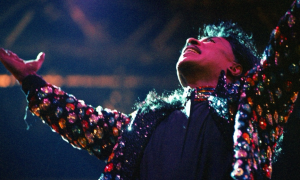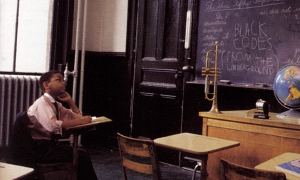Home » Jazz Articles » Opinion » If I can make it here...
If I can make it here...
In late October of 1985 I loaded my car with my string bass, electric bass, Polytone amp, record collection, some cassettes a friend gave me for the drive, a boombox, my clothes, a thermos for the enormous amount of black coffee I would drink, a full-length down jacket which I would use for a blanket when sleeping in my car at night and a pile of blankets that would be my bed in Brooklyn. With my belongings loaded I started my journey to New York City. I still remember the strange feeling of excitement I had driving down a familiar 37th Avenue in Portland, Oregon and having no idea of what lay ahead. New York was a very romantic idea to me; it represented jazz—you had to go there if you were serious, you had to go there if you really wanted to learn to play. I moved to New York to play jazz and to learn how to play jazz. That was it. It wasn't for fame or fortune or anything else. At that point in time, at 23 years old, nothing else seemed to matter to me. Jazz music was my life. The drive was basically five days. I arrived through the Holland Tunnel Sunday morning Nov. 3rd and immediately felt the energy of New York City. I had been here before, having come for a month to study with Cecil McBee, but coming here to live was an entirely different feeling. I knew a friend of mine from Portland, drummer Alan Jones, had needed a roommate and that solidified my decision to move.
Our place in Brooklyn was unusual—a big apartment in a huge building with elevators but no doorman that was probably once a great place to live. We paid the super our rent the first month, but within a couple of days we were told that we had to move to a different apartment. So in my first week in the city I was moving into my second apartment. Strangely enough, the super never again asked us for rent. The new apartment had electricity and phone service, though not in our name. Somehow we figured out the phone number and thought we were set with no rent, free electricity and phone service. Of course within days we had no phone or electricity. Having no phone was not a big deal; there was a pay phone on the corner and I had a service that took my calls which were few and far between. The electricity was a different story. Since we weren't legally living there we couldn't call and get service. For a while we used large Mason jars with small white candles for light. Since it was winter, we put our milk and eggs on the ledge outside of the window. Eventually, Alan rigged up the electricity by running a cord to a light in the hallway outside of the apartment. At one time this apartment had been quite luxurious, but that time had long passed. The bathroom had a great shower separate from the bathtub, but the water was mostly draining into the apartment below. Soon the bathtub faucets stopped working so we ran water down a board from the sink to the bathtub.
But none of these crazy circumstances really bothered me; I was in New York to play jazz and that was what I was doing. Six nights a week I was playing in the house band with Ted Curson for a late night jam session at the Blue Note. Since I had no rent or utilities bills except for my phone service, the 20 dollars nightly was enough to get by on. I learned a lot with Ted Curson. He never said what tune he was going to play and never counted one off. It became a source of pride to not get caught on a tune you didn't know. Also, I was able to hear the main act every week without paying a cover charge.
At the session I met a lot of musicians, some of whom I would work with, some of whom have become close friends. I remember meeting Harry Connick Jr. there and playing "Song For My Father." I remember playing with Jeff "Tain" Watts for the first time, playing tunes with Junior Mance, Gil Coggins and Chuck Mangione (who actually quoted "Feels So Good"). I remember running into Benny Green, who I had not seen since my high school band played a concert with his, hearing and playing with Russell Malone for the first time, talking to Al Foster about Wilbur Ware, talking to Tommy Flanagan about how cats used to play the bass. I remember coming off the bandstand sweaty and Art Blakey telling me "if you catch cold and die, I'll kill you." I remember playing piano on "Take The A Train" when Jaco Pastorius played acoustic bass. Many nights after the gig, Ted and I would go to a diner around the corner and have breakfast. I'll never forget the night Art Taylor joined us and told stories of playing and hanging out with Monk and Miles. This was all happening in my first year in New York City; my romantic thoughts of New York were being confirmed daily.
< Previous
Miles Davis, Miles Smiles, and the In...
Next >
Cry For Peace
Comments
Tags
For the Love of Jazz
 All About Jazz has been a pillar of jazz since 1995, championing it as an art form and, more importantly, supporting the musicians who create it. Our enduring commitment has made "AAJ" one of the most culturally important websites of its kind, read by hundreds of thousands of fans, musicians and industry figures every month.
All About Jazz has been a pillar of jazz since 1995, championing it as an art form and, more importantly, supporting the musicians who create it. Our enduring commitment has made "AAJ" one of the most culturally important websites of its kind, read by hundreds of thousands of fans, musicians and industry figures every month.























